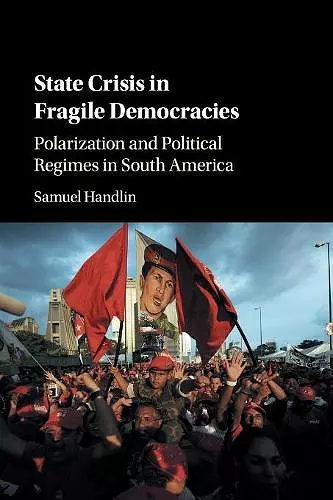State Crisis in Fragile Democracies
Polarization and Political Regimes in South America
Format:Paperback
Publisher:Cambridge University Press
Published:16th May '19
Currently unavailable, and unfortunately no date known when it will be back

This book develops a new political-institutional explanation of South America's 'two lefts' and the divergent fates of the region's democratic regimes.
The transformation of South American politics in the twenty-first century challenges scholars to rethink the sources of regional variation in party system polarization and regime dynamics. Where existing accounts focus on economic variables, this book presents a novel political-institutional explanation and deepens our understanding of polarizing populism around the world.This book offers a novel political-institutional explanation for variation in political polarization, outsider populism, and the fate of democratic regimes across twenty-first-century South America. Drawing upon a wealth of primary evidence and employing process tracing tests to evaluate key causal claims, the book examines how the occurrence - or not - of state crises and the inherited strength of left wing political actors combined to push countries onto distinct party system trajectories characterized by different kinds of left parties and movements, highly variant levels of polarization, and ultimately divergent political regime dynamics. The book challenges extant interpretations of political variation during Latin America's turn to the left, which have centered on economic explanations. It also develops new theoretical propositions for understanding polarization, populism, and democratic erosion in young democracies across the world.
'Latin America's 'Left Turn' produced strikingly diverse outcomes, ranging from moderate reform and stable democracy in Chile and Uruguay to polarization and democratic erosion in Ecuador and Venezuela. Although numerous studies have sought to explain this variation, State Crisis in Fragile Democracies stands out as the best. Building on Guillermo O'Donnell, Handlin's book highlights the centrality of the state in shaping party system and regime outcomes in Latin America. It demonstrates with impressive rigor that it was state crisis - not public opposition to neoliberalism, the weakness of political parties or commodity rents - that drove polarizing populism and democratic crisis in Bolivia, Ecuador, and Venezuela. This book will make an enduring contribution to our understanding of contemporary populism and political regimes. I recommend it to all students of Latin American politics.' Steven Levitsky, Harvard University, Massachusetts
'State Crisis in Fragile Democracies: Polarization and Political Regimes in South America is a major work on some of the most politically and theoretically important issues in contemporary South American politics. What explains different trajectories in party system polarization and political regimes in the post Cold-War era in Latin America? Samuel Handlin's book advances a novel theoretical argument and makes an important empirical contribution on both of these burning issues.' Scott Mainwaring, Harvard University, Massachusetts
'State Crisis in Fragile Democracies is an impressive piece of work that breaks new ground in the study of political institutions, polarization, and democracy in South America and beyond. Samuel Handlin provides an original interpretation for the rise of two quite different 'lefts' in the recent Latin American experience, placing the paradigmatic cases of Brazil and Venezuela in a larger comparative perspective. This interpretation highlights the importance of political factors in shaping different types of leftist alternatives, focusing on the interaction between state crises and the organizational strength of the left at the end of the Cold War. This book is essential reading for anyone who seeks to understand the sources of political and ideological polarization, as well as its impact on democratic governance.' Kenneth M. Roberts, Cornell University, New York
'Handlin's use of process tracing is very rigorous … Handlin's book is an excellent example of how scholars can improve transparency in qualitative methods.' Laura Gamboa, Perspectives on Politics
ISBN: 9781108401418
Dimensions: 229mm x 154mm x 20mm
Weight: 450g
335 pages